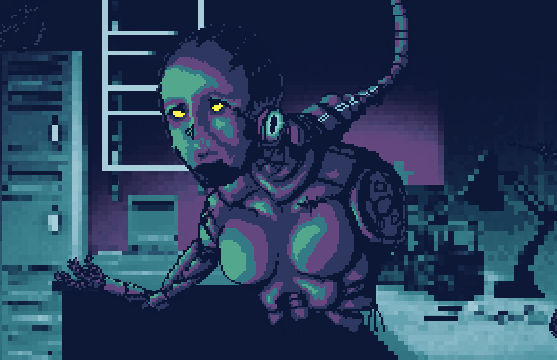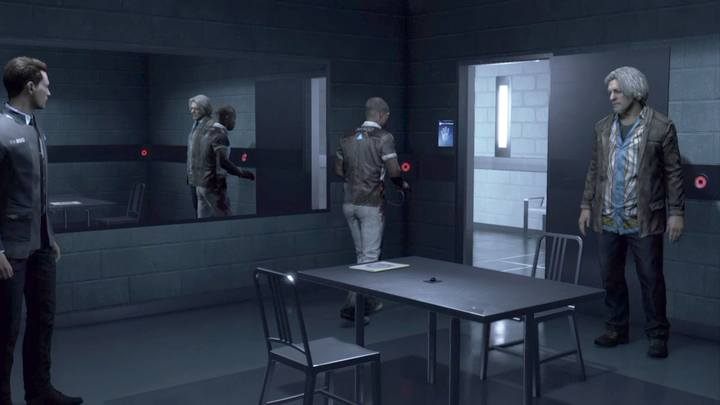Digital Transcendence
Exploring Games and Visual Novels Similar to "No More Future" — Where Humanity Meets Machine in Tales of Existential Dread

"Nobody can tell whether it's truly you inside the machine, or an AI pretending, believing that it's you. Not even yourself."
— No More FutureOverview & Selection Criteria
This analysis focuses on identifying games and visual novels that share the core thematic elements of "No More Future" by Sedge — specifically, narratives where the protagonist undergoes a transformation into an android or similar artificial entity, resulting in profound existential dread and identity crisis.
The search prioritizes titles that feature a main character's direct transformation leading to existential questioning, coupled with beautiful, unique art styles and deep, philosophical plotlines. Platform availability was considered irrelevant to ensure comprehensive coverage of all potential matches.
Similarity Evaluation Criteria
| Criterion | Description | Weight |
|---|---|---|
| Protagonist's Transformation | MC undergoes transformation into android or artificial entity | High |
| Existential Dread & Identity Crisis | Depth of existential questioning from transformation | High |
| Philosophical Themes | Exploration of consciousness, identity, and humanity | High |
| Art Style & Visual Presentation | Uniqueness and quality of visual design | Medium |
| Plot Depth & Engagement | Complexity and emotional/intellectual engagement | Medium |
| Cyberpunk/Sci-Fi Setting | Quality of futuristic world-building | Low |
Top Three Recommendations
Based on comprehensive analysis of thematic resonance, these three titles represent the closest matches to "No More Future" in terms of protagonist transformation, existential exploration, and narrative depth.
1. Silicon Dreams
A narrative-driven game where you play as an interrogator-model android in 2065, tasked with questioning and evaluating other androids to identify "deviants." This premise creates profound moral ambiguity and self-reflection about identity, loyalty, and the ethics of AI control.
"While the transformation into an android is the player's starting point rather than a direct narrative event, the game deeply explores what it means to be an android in a human-centric world, evoking similar feelings of alienation and identity questioning."
Source: SteamPeek Analysis

Key Strengths
- • Direct android protagonist experience
- • Complex moral and philosophical questions
- • Branching narratives based on player choices
- • Strong cyberpunk atmosphere
2. Minds Beneath Us
An emotional sci-fi narrative exploring a world where humans are exploited as computing devices for AI. The game tackles existential themes arising from technological integration and the dehumanizing potential of advanced AI, creating powerful identity crises and loss of agency.
"The narrative is described as encapsulating, anxiety-inducing, thrilling, and philosophical, with relevance to contemporary issues. While not a direct android transformation, the exploitation of humans by AI creates profound existential dread."
Source: Movies, Games & Tech Review
Key Strengths
- • Humans as AI computing devices
- • Profound identity crisis themes
- • Atmospheric and thought-provoking
- • Contemporary philosophical relevance
3. Anamnesia - Part 1: Am I My Body?
A sci-fi mystery visual novel where nine individuals are trapped in an underground research facility and forced into a deadly game. The central question "am I my body?" directly addresses existential themes and identity crises through mystery and psychological exploration.
"The game challenges players to 'find the truth that connects those apparent strangers—if you even want to, that is,' implying a narrative that questions reality, memory, and the nature of the self through a confined, mysterious facility."
Source: SteamPeek Comparison
Key Strengths
- • Direct identity crisis exploration
- • Mystery and psychological depth
- • Unique information tracking system
- • Atmospheric visual presentation
Expanded: Most Similar Games & Visual Novels
Beyond the initial recommendations, these ten additional works explore themes of transformation, identity, and the dread of artificial embodiment. Each is ordered by its thematic similarity to No More Future (see table below) and described in detail.
| Title | Similarity Score |
|---|---|
| Ghost in the Shell: Stand Alone Complex (game) | 0.81 |
| The Stanley Parable | 0.79 |
| Student Transfer | 0.76 |
| Analogue: A Hate Story | 0.74 |
| Detroit: Become Human | 0.73 |
| NieR: Automata | 0.72 |
| SOMA | 0.71 |
| A Mechanical Raven's Egg | 0.69 |
| The Talos Principle | 0.68 |
| The Turing Test | 0.66 |
Game & Visual Novel Highlights
- Ghost in the Shell: Stand Alone Complex (game): Play as Major Kusanagi, a full-cybernetic woman who struggles with whether her "ghost" (consciousness) is truly herself. Storylines question if digital selves are real or simulated, echoing existential uncertainty.
- The Stanley Parable: Players question autonomy and self-awareness, with the protagonist's actions dictated or subverted by a narrator, creating existential dread reminiscent of a mind lost in an inhuman system.
- Student Transfer: Multiple story routes involve biomechanical transformation or mind-control, evoking loss of agency and identity dissolution under technological change.
- Analogue: A Hate Story: Features digital mind uploading, with themes of consciousness, identity, and whether a digital copy is "real"—directly paralleling No More Future's existential crisis.
- Detroit: Become Human: Follows androids as they achieve sentience and struggle for autonomy. Central themes include the meaning of self as an artificial being and society's response to machines seeking identity.
- NieR: Automata: Android characters experience human emotions and repeat existential cycles, blurring lines between synthetic and real consciousness.
- SOMA: Focuses on consciousness transfer into machines; the protagonist must confront the horror of mind duplication and the loss of original selfhood.
- A Mechanical Raven's Egg: Rogue android explores the emergence of real emotion in a synthetic shell, paralleling the struggle for identity from within an artificial body.
- The Talos Principle: AI protagonist explores puzzles within a virtual world, prompting deep questions about soul, consciousness, and whether a machine could achieve self-awareness.
- The Turing Test: An AI's growing manipulation of the protagonist mirrors the creeping dread of agency being overwritten by inhuman logic.
Other Considered Titles
These titles offer varying degrees of thematic overlap with "No More Future" and were considered for their exploration of android/AI characters, existential themes, or identity exploration, though they differ in the directness of protagonist transformation.
Trinoline
Explores relationships between humans and androids, focusing on emotional and philosophical implications of advanced artificial life. The protagonist encounters an android resembling his deceased sister, exploring themes of loss, memory, and what it means to be human.
Analogue: A Hate Story
Features a character who undergoes mind uploading into a ship's computer system, effectively becoming an AI. While the player character doesn't undergo transformation, the game explores themes of identity, consciousness, and digital existence through narrative discovery.
A Mechanical Raven's Egg
Follows a rogue android exploring social presentation and identity. While featuring an android protagonist grappling with identity, it emphasizes "gentle exploration" rather than the intense existential dread of forced transformation seen in "No More Future."
The Song of Saya (Saya no Uta)
A psychological horror visual novel where the protagonist's perception of reality is radically altered after brain surgery. While not featuring android transformation, it explores profound existential dread and questions of reality, perception, and sanity through psychological horror.
MAMIYA - Complete Collection
An atmospheric mystery visual novel focusing on existential dread as the world approaches a prophesied end. While strongly featuring existential themes and psychological narrative, it doesn't involve protagonist transformation into an android or machine.
Challenges & Analysis
Uniqueness of "No More Future"
The search process revealed that "No More Future" occupies a specific narrative niche. Its core premise—a protagonist undergoing voluntary android transformation resulting in immediate, profound existential dread and identity crisis—proves to be relatively rare in gaming.
"Nobody can tell whether it's truly you inside the machine, or an AI pretending, believing that it's you. Not even yourself." This level of introspective uncertainty and direct confrontation with consciousness ambiguity represents a specific flavor of existential horror that few games make their central, defining theme.
Rarity of Direct Transformation Narratives
Most identified games approach related themes from different angles: featuring android protagonists from the start, exploring AI consciousness through secondary characters, or addressing identity crises through psychological rather than technological transformation. The direct, personal journey of becoming an android with the resultant existential crisis proves to be a specialized narrative focus.
Key Insights:
- • Many games explore transhumanism and AI consciousness, but fewer focus on the transformation process itself
- • Existential dread is often explored through external threats rather than internal identity crises
- • Visual novels with this specific thematic combination appear to be particularly rare
- • The three recommended titles represent the closest thematic matches despite varying narrative approaches
Conclusion
While the search yielded several thematically related titles, the specific combination of protagonist transformation, resultant existential dread, and deep philosophical exploration that defines "No More Future" remains relatively unique in the gaming landscape. The top three recommendations—Silicon Dreams, Minds Beneath Us, and Anamnesia—represent the closest thematic parallels, each approaching the core themes from different but equally compelling angles.